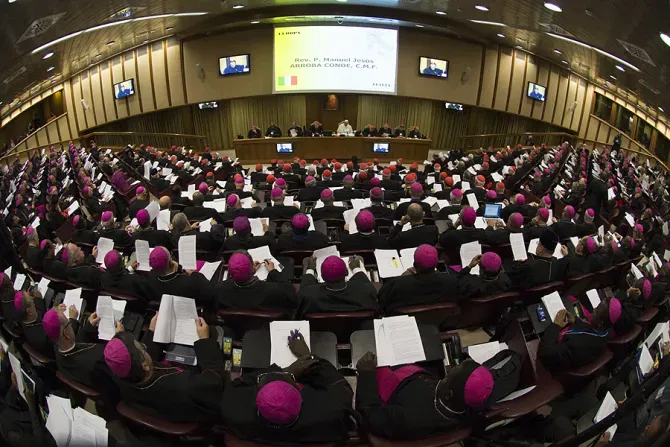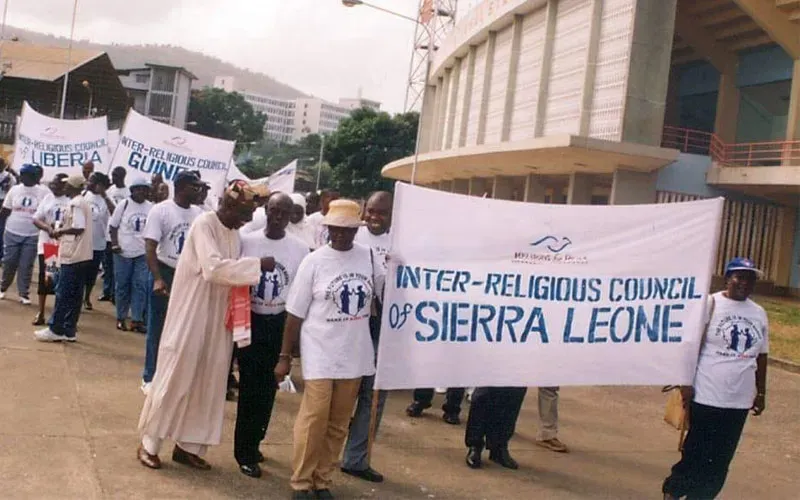The preparatory document has been released for a period of “pre-Synodal discernment” that will influence a second draft of the text to be published before June 2023.
According to the Vatican, the preparatory document is “a tool to facilitate the first phase of listening to and consulting the People of God in the particular Churches” for the Diocesan phase of the Synod.
One objective of the Synod on Synodality, according to the preparatory document, is to encourage a participative and inclusive process that offers everyone, especially those who for various reasons find themselves on the margins, the opportunity to express themselves and to be heard in order to contribute to the edification of the people of God.
In the September 14 interview with ACI Africa, Fr. Orobator highlighted groups of people who inhabit the peripheries, including the refugees and migrants, the youth, women and people with “unconventional” sexual orientations.
“Pope Francis has been inviting the Church to go out to the margins. He explains that you see reality better, more clearly and more authentically from the margins,” the Priest said, and explained, “The margins are those zones where we have excluded people; where the people feel more vulnerable.”
(Story continues below)
“Jesus would call these the least of my people. They include the refugees, the migrants, the elderly, people of sexual orientations that some other people consider unconventional and therefore are excluded on the basis of their orientation, young people who have seen their future narrowing and getting more and more limited, women in society and in Church whose voices are suppressed or ignored. These are the people who inhabit places that Pope Francis refers to as the margins or the peripheries,” Fr. Orobator clarified.
The preparatory document also calls for the generation of relationships among members of Christian communities as well as between communities and other social groups including communities of believers of other denominations and religions, civil society organizations and popular movements.
In the September 14 interview with ACI Africa, Fr. Orobator also clarified the place of politicians in Church in reference to the ban on political campaigns in churches in Kenya.
“Everyone is welcome in church irrespective of their political affiliations. But we have to be clear; the Church as a community has a very clear mission. It is a prophetic mission to announce the word of God in such a way that it is not aligned to one political group or the other,” Fr. Orobator said.
He added, “It is very important that as a Christian community we don’t become corrupted into one political camp against the other. That in itself will undermine the mission of the Church to proclaim the good news.”
“Politicians being told to stay outside church is basically saying that the church has a message for everybody and it doesn’t favor one over the other. It is different from politics which is about advancing one’s agenda over the agenda of the other. Partisanship is what the Church should avoid,” he said.
Journeying with other faiths, the JCAM President said, will involve inter-religious dialogues and working together on projects that help the people grow in faith.
Fr. Orobator also explained the history of evolution of media and the Church and acknowledged that the media as a means of furthering the mission of the Church has become even more indispensable as it allows the Church to reach the people within and beyond its geographical location.
He said that media has been an important means through which the gospel is proclaimed, and added, “The Pope himself has social media platforms that have millions of followers.”
The preparatory document also explores the need to include the people of God at the local level in the decision-making process of the Church.
The JCAM President underscored the need to include the local people in the Church in decision making processes, all the way from Parishes.
“Let everybody be given a voice so that the outcome of this process will be something that we can all own. It is not something that is decided from the top and imposed at the bottom. It is about respecting the sense of the faithful,” he said, adding that decision-making in the Church is not “an exclusive preserve of the ecclesiastical leaders.”
Fr. Orobator observed that the structure of Small Christian communities (SCCs) is a gift to the Church especially in Eastern Africa where it is popular.
He said that SCCs give the Church a platform and context in which to deepen this issue of Synodality, noting that it is in such basic Church groups that people gather at the local level and express their opinions.
While the universal preparatory document highlights the global context of migrants amid other challenges on which the synod on Solidarity is pegged, Fr. Orobator identifies challenges that are specific to Africa.
He highlights the challenge of refugees in South Sudan, Eritrea, the Democratic Republic of Congo (DRC) and the evolving refugee crisis in Mozambique.
The Jesuit Priest says the challenges are consequences of conflict and the crisis of climate change in the world.
“We see very extreme weather events that are linked to climate change.,” he says, and adds, “We see drought in Madagascar and Kenya. We see locust infestation across Eastern Africa. We see flooding across parts of West Africa. All these are weather events that have become more and more frequent and we see also the link with global warming.”
“We also see political instability, for instance the coup we just witnessed in Guinea. We can’t forget the current pandemic that has deepened the crisis of healthcare in African countries and the access to vaccines. These are very serious challenges,” the JCAM official says.
He says identifying challenges that ail the African continent will inform the Synodality conversation.
“When you are engaged in the process of discernment, you have to be attentive to where you start. Discernment doesn’t occur in a vacuum. There has to be a context and that is what will inform how we journey together and heal as a people of God,” he tells ACI Africa.
Pope Francis will “inaugurate the Synodal path” next month, over the weekend of October 9-10 with an opening session and Holy Mass.
All Dioceses are invited also to offer an opening Eucharistic celebration on Sunday, October 17 and then embark on the Synodality conversations until April 2022. Conversations will then move to the continental phases and lastly to the universal phase.
Jesuits in Africa and Madagascar have announced plans to engage with members of the Clergy and Laity in the Church in JCAM’s conversations on Synodality.
“We want to bring together cross-sectional people in the church to have a conversation on how we can best support, animate, accompany and enhance this process especially in the preparatory phases,” Fr. Orobator told ACI Africa during the September 14 interview.
He added, in reference to the JCAM event slated for September 18, “We don’t have a present agenda. It’s the very nature of Synodality where you come in with an open mind and invite the Holy Spirit to animate the conversation. We have invited theologians, African members of the Vatican commissions, Synodical secretariats.”
The aim of the conversations, the Jesuit Priest said, is to find out how the conference (JCAM) can best support the preparatory phases in the Church in various positions as members of Clergy as well as the Lay faithful.
Agnes Aineah is a Kenyan journalist with a background in digital and newspaper reporting. She holds a Master of Arts in Digital Journalism from the Aga Khan University, Graduate School of Media and Communications and a Bachelor's Degree in Linguistics, Media and Communications from Kenya's Moi University. Agnes currently serves as a journalist for ACI Africa.








